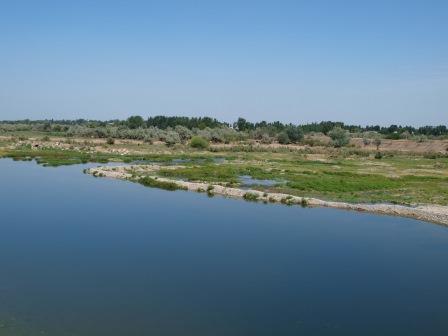16th August 2013 Tashkent, Uzbekistan
Heat
British people are famous for talking about the weather. But last week and the week before nobody in Tashkent seemed to be talking about anything else, with temperatures in the forties, and records being broken in Samarkand and elsewhere. The Ministry for Emergency Situations sent out, apparently for the first time ever, text messages with advice about drinking plenty of water, staying indoors and generally staying safe and healthy.
In the middle of the heat wave we had a visit from a colleague based in Moscow who works for the UK Department of Energy and Climate Change. He came to Tashkent for meetings with Uzgidromet – the body that co-ordinates climate policy in Uzbekistan – and others with an interest in climate change, to share some of the UK’s experience in this area. We had some fascinating meetings with Uzbekistan’s experts.
Climate policy falls into two parts. There’s mitigation, which in practice means reducing greenhouse gas emissions to lower the probability of catastrophic change to the earth’s climate; and there’s adaptation, which means taking measures to reduce the risks created by the changes that are already happening or are likely to happen in the future. In Britain, a project ran from 2008 to 2012 to produce an analysis of the risks climate change would create for the UK. The project’s report is at https://www.gov.uk/government/publications/uk-climate-change-risk-assessment-government-report and it identifies a number of risks, including more frequent and more severe flooding as well as health problems arising from higher temperatures in the summer. Last month a national adaptation plan was laid before parliament, which builds on the risk analysis to set out actions that we will need to take to ensure that we are well prepared. At the simplest level, it’s a question of information, and publication, ensuring people are aware of the risks and how they can minimise them. Beyond that, we need to look at things like flood protection, making sure our agriculture is resilient, building roads and railways and public buildings that will stand the additional stresses.
On the mitigation side, the UK is committed to reducing its greenhouse gas emissions by 80% (against a 1990 baseline) by 2050 and by 34% by 2020. The government has set a series of “carbon budgets” that set out the reductions that will be made over a series of five-year periods. Decarbonising the economy isn’t easy, because our economies are built around the use of fossil fuels – oil, gas and coal. Ultimately, we need to shift to using different energy sources, all of which have limitations as well as advantages.
My colleague’s presentation at Uzgidromet brought out what I thought were some interesting facts about the process going on in the UK. First, how much can be done through measures to use energy more efficiently. In Britain that includes better insulation of our houses so that they need less heating in winter, encouraging people to use more fuel-efficient vehicles through differential taxes and road charges, and working with industry to set standards for each sector, again encouraging greater efficiency through tax concessions. The big reductions over the first five-year carbon budget period are all through greater efficiency; and most of these measures very quickly pay for themselves – they are things that, logically, people should be doing anyway. There were also some striking figures showing that energy efficiency and other measures to “green” the economy translate directly into a higher economic growth rate. So it’s not a case of having to choose between climate action and growth, but of finding ways to combine the two.
